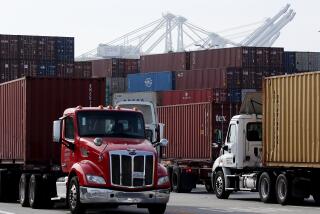Frequent Fryers Fuel Eco-Friendly Veggie Van
- Share via
First came the Oscar Mayer Wienermobile, which travels the country celebrating a particular kind of fast food.
Now comes the Veggie Van, which is powered by fast food.
Actually, the 1986 Winnebago, which is currently touring California to promote alternative energy, runs on a biodiesel fuel converted from vegetable oil that was used in fast-food fryers.
The van’s trip to schools, parks and public events around the state is being sponsored by Green Mountain Energy Resources, which has been one of the most successful companies providing electricity from renewable resources in California’s new competitive electricity market.
“Electricity generation is the number one industrial source of air pollution in this country,” said Kevin Hartley, vice president of marketing for the Vermont-based company. “What better way to educate consumers on the benefits of using cleaner energy than having the funky, cleaner-burning, french-fry-grease-fueled Veggie Van touring California as an example of what we’re advocating.”
The retrofitted van, which is owned by eco-activists Josh and Kaia Tickell of Sarasota, Fla., also uses a solar electricity system, powered by two photovoltaic panels on the roof, to run the interior lights, refrigerator, computer and educational displays.
The Veggie Van began as a college project, and the Tickells have taken it on two cross-country tours. To fuel the van, the couple built a portable fuel processor that they call the Green Grease Machine, which produces biodiesel fuel from the used fryer oil of fast-food restaurants.
Utilities Win Dining OK: The overhaul of California’s electricity industry has created uncounted controversies and complications, but this one takes the cake. Or maybe the mystery meat.
Some of the state’s investor-owned utilities had asked the California Public Utilities Commission for permission to share their company cafeterias with their corporate affiliates, and last Thursday the commission said OK.
The PUC last year issued rules intended to avoid any unfair competitive advantages for the unregulated electricity-peddling cousins of the utilities, forbidding such things as discounts and sharing of employees or inside information. The utilities--Southern California Edison, San Diego Gas & Electric and Pacific Gas & Electric, among them--were required to keep separate office space and computer systems from their unregulated affiliates, such as Edison Source, Sempra Energy Solutions and PG&E; Energy Services.
But utilities officials had groused privately that the regulations left several points unclear, among them: Is it acceptable to eat at adjoining tables in a restaurant, to exchange pleasantries in the elevator or for regulated utility employees to date unregulated affiliate employees?
Despite these odd ramifications, these are serious rules. The PUC is considering fining San Francisco-based Pacific Gas & Electric as much as $10 million for violating the regulations in advertising.
At Thursday’s PUC meeting, commissioners briefly poked fun at the cafeteria-sharing requests by Edison, PG&E;, SDG&E; and Southern California Gas (which shares a corporate parent with SDG&E;). But the commission ultimately approved the Edison and PG&E; requests (but held SDG&E; and SoCal Gas to further discuss the recently completed merger of their corporate parents).
“The Energy Division had interpreted the cafeteria as a facility they could not share” because employees might, perhaps inadvertently, let inside information slip, a spokesman said. “On the other hand, they could just go down to McDonald’s or they might be on the same bowling team. You’re never going to stop all contact.”
*
Nancy Rivera Brooks can be contacted by e-mail at [email protected] or by fax at (213) 237-7837.
More to Read
Inside the business of entertainment
The Wide Shot brings you news, analysis and insights on everything from streaming wars to production — and what it all means for the future.
You may occasionally receive promotional content from the Los Angeles Times.










